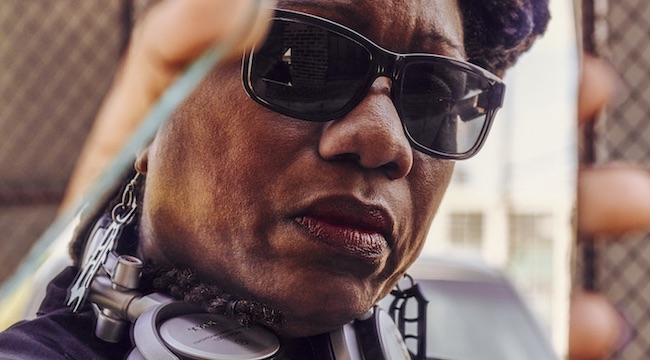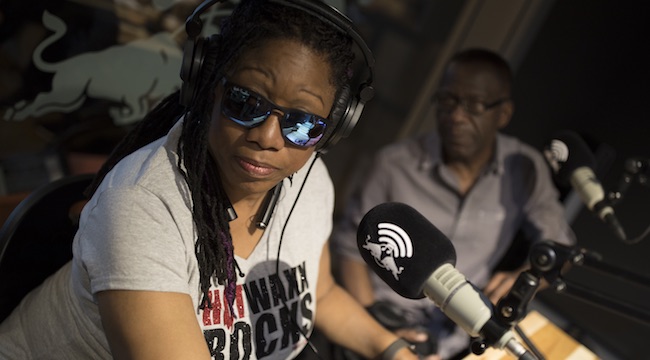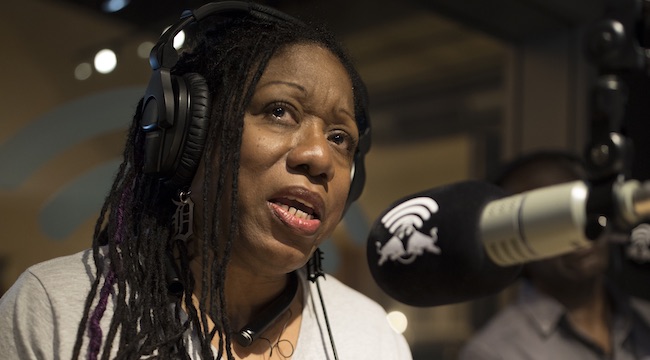
Last month in Detroit, Red Bull honored the city’s rich heritage as one of the foundational centers of electronic music in America with their Live From Detroit event during the city’s annual Movement Music Festival. In their downtown studio, Red Bull Radio opened the Submerge and Underground Resistance-curated “Exhibit 3000: Detroit House” — dubbed a “secret house museum” — that specifically sought to highlight how much Detroit’s black gay underground influence the movement.
To bring things full circle, Red Bull radio also live-streamed performances from the festival, connecting the past with the present music scene that is thriving in the city. During their week-long event, the goal was to highlight the history of house music, yes, but particularly overlooked or underrated members of the community. And while plenty of men get credit for their roles as DJs, producers, and artists in the movement, they weren’t the only ones spinning wax and contributing to the electronic music community back in the day. Of course they weren’t.
Enter Stacey Hotwaxx, a figure so influential she’s been dubbed the “godmother of modern house.” Hale was one the first female techno house DJs and a veteran of the scene since 1989. Back then, she was a staple on the radio and has since performed at festivals all over the world. Currently, Hale already works closely with Red Bull Radio and hosts her own show. She also teaches after-school programs at Girls Rock Detroit and somehow still finds time to be the assistant musical director of Black Women Rock, an organization that focuses on helping women succeed of color in artistic communities.
During the event, I got the opportunity to interview Hale about how she got her DJ nickname, her legacy within Detroit, and what elements it takes to make a great DJ set. Read our condensed conversation below.
When did you first get the nickname “Hotwaxx”?
A friend of mine gave me that name he was a — he is — a hairdresser. Well, I don’t know if he’s still doing hair or not but one day I was sitting in his chair and he was doing my hair and I’d already been playing music and he says ‘you’re Hotwaxx’ and I said ‘I’m who??’ and he says ‘you’re Hotwaxx’ and I’m like ‘whatever.’ So I didn’t pick it, he picked it. And when I went to play on radio I thought that you needed to have a DJ name so you know, I put the Hotwaxx with it, and it stuck.
Two x’s, one t — and you know what’s cool about that my graphic artist discovered that I should trademark it because of that spelling if you Google it all my life comes up. I was like whoa. But now every time I try to be just ‘Hotwaxx’ everybody still says the whole thing, Stacey Hotwaxx Hale.

One of the things written about you that I found in my research — “For as long as there is music and those who faithfully dance, there will always be a need for the Godmother of House: DJ Stacey Hotwaxx.” What does that title mean to you, the Godmother of House music?
It’s actually an honor for the fans to deem me that, I didn’t do it. They did it and I never really knew where it came from, and I only embraced it maybe three years ago. Cause they would say ‘Godmother, Godmother’ and I’m like, I’m nobody’s Godmother and it sounds… I took it as sounding ancient or old. But you know in reality we know that’s not what it is, but that’s how I felt and sometimes. You know when Europeans are speaking to me… you know how you get prefixes of names mixed up? So I’ve had people from other countries come up to me and go ‘Grandmother! Grandmother!’ and I know what they meant and I don’t want to say ‘Not Grandmother, Godmother!’ so I just let it be.
Just two or three years ago I found out how it happened, the lady that started calling me that told me the story. I was at one of my booths selling merchandise and she said how the name Godmother came up, and ironically, The Godfather is my favorite movie, it’s been that since how long ago.
I saw that picture of you with the t-shirt with The Godfather logo but “Godmother” — I thought that was awesome.
Mhm, that same designer I’m talking about Stephanie Carr, told me that Hotwaxx was unanimous with me, designed that. So when they did that, I really liked that.
Tell me a little bit about back when you first started DJing, you were one of the first female DJs in Detroit?
I’m not the first DJ in Detroit period, I’m the first DJ that was underground and then went mainstream that was mixing music and that was progressive. The first one to go in that direction, you know there were other female DJs that were on the radio, they may have played in clubs, you know put on a song, say something, put something else on, something like that.
What was your own personal entry point into loving music beyond being just a casual listener?
It actually happened at a very very young age, I didn’t know the definition of it. I’ve been entertaining since I was 4, performing. I had brothers who were ten years older than me and they were music lovers. My brother had this wall of albums and components and I would always be very fascinated by it. I would put on shows in the basement and invite our parents and I’d round up the kids in the neighborhood and put on shows like I was already prepping my life and I didn’t know it.
And by the time I was 16, 17 I would have basement parties, and I’d have music recorded on the reel-to-reel and I’d have no space between the songs. I remembered Ron Murphy asked me ‘why don’t you have any space between the songs?’ I said ‘I don’t ever want to hear silence’ I wanted it to be continuous. So I always said I’d love to be a DJ but I’m not that talking one. So that why I didn’t — I didn’t know there was another kind. So the seed was planted naturally, for me to be a DJ and after I heard mixing for the first time I was like ‘ah! that’s what I need to do.’

In your mind, what elements does it take to make a great DJ set?
First of all, you need to be able to play longer than an hour, you know back from the time where I came we played for five hours. So you’re able to tell a story, and if you’re really about it, delivering the message of the music, that’s the best way to do it. Not that you can do it in five hours but at least two to three hours where you can pass on a message. Nobody really cares how well you can mix, although I am a mixer and I can mix, they care more about what the song is, what’s the jam, how you feel — you remember how you felt. Think about it when you’re out and you hear something, it’s how it made you feel. Not how well it was mixed, that’s a plus but you know cause music is a message.
What do you think electronic music and the dance floor provides for listeners that is different from other genres? What do you think it is about this style of music + that space that has created such a singular movement?
It allows a chance to be free, to be able to dance. That’s what electronic music is, you’ve probably been and seen different performers and you know people are just going crazy because they way it made them feel. And you know electronic music tends to do that, dance music, that is what it’s for. It’s not to sit back and relax to.
I know you have a background in engineering, can you tell me a little bit about your decision to go down that path and how it ended up becoming part of your work as a DJ?
I went back to school at age 25, I kept getting laid off at my job so I went back to school full time and was still DJing, and one of the things I remember doing, and I remember thinking ‘how crazy’ I would do math problems, calculus or differential equations homework, get up mix a song, sit back down, do math, get up, mix a song, you know because I was just determined.
It was ironic, I saw a young girl doing that at a rehearsal out in San Francisco, 15 years old, saxophone player and she’d get up, do her part and sit back down and do algebra and I saw her do that and I was like girl!
Are there things in your mind that you link between engineering and DJing?
I actually am a geek, I love components, that was part of the love, seeing it all on the wall that belonged to my brother, it was my mission to see how it all worked, how to hook it up, what it did, and I’m still like that this day.
When you were learning to mix records at clubs in Detroit during the late ‘80s, did you realize back then this is something you wanted to do for the rest of your life? Or did it feel more casual at first?
It was something I wanted to do forever, I just really enjoy it. I’ll always be in the business of music, even if I’m not mixing, I teach, so I want that to continue on and influence all ages anyone that strikes the interest.
Did people discourage you from pursuing this career because of your gender? What were some of the reactions you dealt with early on?
Oh absolutely, you know the men would be [laughs] just over the top. I’ve hit enough brick walls due to that, but I was determined and I am still today.
Uproxx was hosted at the Movement Music Festival by Red Bull Radio. You can read our press trip/hosting policy here.






